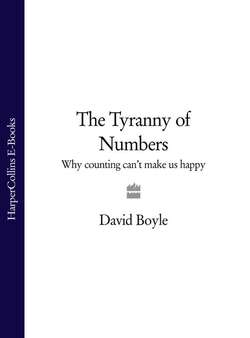Читать книгу The Tyranny of Numbers: Why Counting Can’t Make Us Happy - David Boyle - Страница 24
Counting paradox 2: If you count the wrong thing, you go backwards
ОглавлениеBecause it is so hard to measure what is really important, governments and institutions pin down something else. They have to. But the consequences of pinning down the wrong thing are severe: all your resources will be focussed on achieving something you didn’t mean to.
Take school league tables, for example. When the Thatcher government latched onto the idea of forcing schools to compete with each other by measuring the progress of children at three comparable moments of their lives, they were intending to raise standards. They probably have done in a narrow way. The trouble was that schools concentrated on the test results to improve their position on the tables, which was anyway pretty meaningless. That meant excluding pupils who may drag down the results, concentrating on the D grade pupils – the only ones who could make a difference in exam result league tables – to the detriment of the others. It meant concentrating on subject areas the school could compete in, never mind whether they were the subjects the children needed. And worst of all, it meant squeezing the curriculum to produce children that can read and write but are, according to National Association of Head Teachers general secretary David Hart, ‘unfit philistines’.
Then there was the business of using hospital waiting lists as a way of measuring the success of the health service. Tony Blair’s new government made an ‘interim promise’, which then hung around their neck like an albatross, to reduce waiting lists by 100,000. They did push the lists down, though painfully slowly. But the result was the emergence of new secret waiting lists for people just to get in to see the hospital consultant, before they were even allowed near a real waiting list. Quick simple easy operations were also speeded up to get the numbers down, at the expense of the difficult ones. And when the hospital league tables of deaths came out in 1999, consultants warned it would make administrators shy of taking on difficult complicated cases.
Governments and pressure groups latch onto the wrong solutions and then busily measure progress towards them. They thought that shifting to diesel fuel for cars would clean up polluted air and measured progress towards achieving it. Result: air full of carcinogenic particulate matter. They thought more homework for primary school children was the solution to underachievement and measured progress towards it. Result: miserable dysfunctional kids.
It has all the makings of a fairy tale. If you choose the wrong measure, you sometimes get the opposite of what you wanted. And any measure has to be a generalization that can’t do justice to the individuals that are included.
